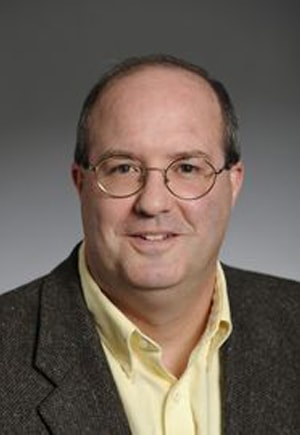Colin Morningstar
Professor of Physics
Nuclear & Particle Physics
Quark Interaction Theory
Wean Hall 8420

Education & Professional Experience
PhD: University of Toronto (Canada), Theoretical Particle Physics (1991)
M.Sc.: University of Toronto (Canada), Theoretical Particle Physics (1986)
Professional Societies:
Fellow, American Physical Society
Professor of Physics, Carnegie Mellon University, 2010–
Indefinite Tenure, Carnegie Mellon University, 2006
Associate Professor, Carnegie Mellon University, 2006–10
Assistant Professor, Carnegie Mellon University, 2000–2006
Assistant Professor, Florida International University, 1999–2000
Post-doctoral Research: UC San Diego, 1995–99
Post-doctoral Research: University of Edinburgh, 1993–95
Post-doctoral Research: Stanford Linear Accelerator Center, 1991–93
Research Interests
My research interests primarily concern nonperturbative phenomena in quantum field theories, with particular emphasis on the study of hadron formation and confinement in quantum chromodynamics using computer simulations of quarks and gluons. Two past highlights include a first comprehensive determination of the glueball spectrum in pure Yang-Mills and the spectrum of heavy-quark hybrid mesons in the leading Born-Oppenheimer approximation (neglecting light quark loops). My collaborators and I are currently focusing on ab initio determinations of the excited baryon and meson spectra using lattice QCD Monte Carlo methods. Our computations are carried out on the NSF XSEDE supercomputers and on machines available through the DOE's INCITE program.
Selected Publications
Lattice QCD study of πΣ − K¯ N scattering and the Λ(1405) resonance, J. Bulava, B. Cid Mora, A.D. Hanlon, B. H¨orz, D. Mohler, C. Morningstar, J. Moscoso, A. Nicholson, F. Romero-L´opez, S. Skinner, A. Walker-Loud, Phys. Rev. D. 109, 014511 (2024) [Editors’ Suggestion]. https://doi.org/10.1103/PhysRevD.109.014511
Two-pole nature of the Λ(1405) from lattice QCD, J. Bulava, B. Cid Mora, A.D. Hanlon, B. H¨orz, D. Mohler, C. Morningstar, J. Moscoso, A. Nicholson, F. Romero-L´opez, S. Skinner, A. Walker-Loud, Phys. Rev. Lett. 132, 051901 (2024) [Editors’ Suggestion]. https://doi.org/10.1103/PhysRevLett.132.051901
Interactions of πK, ππK and KKπ systems at maximal isospin from lattice QCD, Z. Draper, A.D. Hanlon, B. H¨orz, C. Morningstar, F. Romero-L´opez, S.R. Sharpe, JHEP 5, 137 (2023). https://doi.org/10.1007/JHEP05(2023)137
Elastic nucleon-pion scattering at mπ = 200 MeV from lattice QCD, J. Bulava, A.D. Hanlon, B. H¨orz, C. Morningstar, A. Nicholson, F. Romero-L´opez, S. Skinner, P. Vranas, A. Walker-Loud, Nucl. Phys. B987, 116105 (2023). https://doi.org/10.1016/j.nuclphysb.2023.116105
Berkowitz, E., Bulava, J., Chang, C. C., et al.,Two-nucleon S-wave interactions at the SU(3) flavor-symmetric point with m ud ≈ m phys/s : A first lattice QCD calculation with the stochastic Laplacian Heaviside method, Phys. Rev. C 103, 014003 (2021)
Blanton, T.D., Hanlon, A.D., Hörz, B. et al., Interactions of two and three mesons including higher partial waves from lattice QCD. J. High Energ. Phys. 2021, 23 (2021)
J. Bulava, B. Hoerz, F. Knechtli, V Koch, G. Moir, C. Morningstar, M. Peardon, String breaking by light and strange quarks in QCD, Phys. Lett. B 793, 493 (2019)
C.W. Andersen, J. Bulava, B. Hoerz, C. Morningstar, The I=1 pion-pion scattering amplitude and timelike pion form factor from Nf = 2+1 lattice QCD, Nucl. Phys. B 939, 145 (2019)
R. Brett, J. Bulava, J. Fallica, A. Hanlon, B. Hoerz, C. Morningstar, Determination of s- and p-wave I=1/2 Kπ scattering amplitudes in Nf = 2 + 1 lattice QCD, Nucl. Phys. B 932, 29 (2018)
C.W. Andersen, J. Bulava, B. Hoerz, C. Morningstar, The elastic I=3/2 p-wave nucleon-pion scattering amplitude and the Δ(1232) resonance from Nf = 2 + 1 lattice QCD, Phys. Rev. D 97, 014506 (2018)
C. Morningstar, J. Bulava, B. Singha, R. Brett, J. Fallica, A. Hanlon, B. Hoerz, Estimating the two-particle K-matrix for multiple partial waves and decay channels from finite-volume energies, Nucl. Phys. B 924, 477 (2017)
J. Bulava, B. Fahy, B. Hörz, K. J. Juge, C. Morningstar, C. Wong, I = 1 and I = 2 π–π scattering phase shifts from Nf = 2 + 1 lattice QCD, Nucl. Phys. B 910, 842 (2016)
More Publications:
ORCID Researcher ID